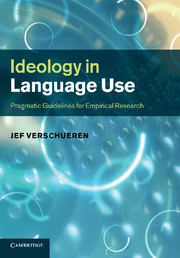2 - Pragmatic rules of engagement
Published online by Cambridge University Press: 05 January 2012
Summary
Language- or discourse-based empirical ideology research is fundamentally concerned with meaning and the way in which it is generated. Therefore, a methodology – with a corresponding set of methods or procedures – should meet one basic requirement: It must enable interpretationwith due regard for what can be intersubjectively established to count as evidence. Details of how I hope to meet this requirement will be put forward in Chapter 3. For now I restrict myself to introducing some elementary pragmatics-based rules for engaging with language use and ideology. These are related to the formulation of research questions and the collection of data.
In actual research practice, most discourse-based studies of ideological processes start from basic intuitions that are not unrelated to the researcher’s involvement. In our migrant research, for instance, the basic intuition was that ‘something was wrong’ with discourse on minorities as it was developing in Belgium, more specifically Flanders, in the late 1980s and early 1990s. There was a lot of obviously well-intended emphasis on integration processes, but at the same time it seemed as if diversity was not taken seriously and that minority members did not have a voice in the debate at all. A sense that ‘something is wrong’ can, of course, only be grounded in a personal position and opinion, i.e., in the way in which one feels ‘involved.’ Similarly, the history textbook materials that offer the second systematic point of reference for this book were collected because of an intuition that it might be interesting to look at presentations of colonization one hundred years ago, just because I was struck by what seemed like a ‘strange’ enumeration (“industrie, commerce, colonisation du monde”) under a specific common category (“les oeuvres de la paix”) in Lavisse (1902). The involvement factor in this case was a secret hope that by looking at such materials from the past some interesting and clarifying light could be shed on certain aspects of international relations today. Or, to take an example from someone else’s work, involvement-related intuitions are referred to by Carbó (2001, p. 65) when she describes an “interested sense of strangeness” as the motivation for studying twentieth-century parliamentary discourse in Mexico after arriving there as an Argentinian refugee and observing “the apparent institutional and social stability of a painfully asymmetrical society, together with an official rhetoric that prided itself in being heir to an armed, popular, revolutionary movement.”
- Type
- Chapter
- Information
- Ideology in Language UsePragmatic Guidelines for Empirical Research, pp. 21 - 50Publisher: Cambridge University PressPrint publication year: 2011



